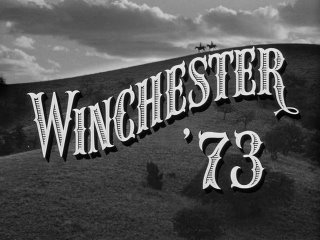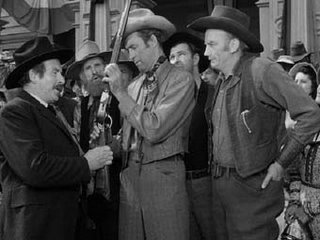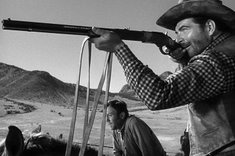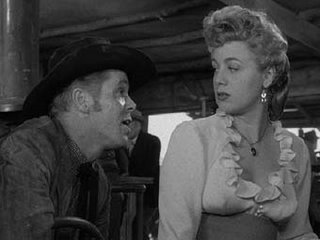 Winchester '73 (1950)
Winchester '73 (1950)
Director: Anthony Mann
High-Spade Frankie Wilson: Did you ever wonder what he'd think about you hunting down Dutch Henry?
Lin McAdam: He'd understand. He taught me to hunt.
Wilson: Not men. Hunting for food, that's alright. Hunting a man to kill him? You're beginning to like it.
McAdam: That's where you're wrong. I don't like it. Some things a man has to do, so he does 'em.
This pointed exchange between James Stewart as rancher-turned-avenger Lin McAdam and Millard Mitchell as his best friend outlines the contradictions that animate Winchester '73 and make it a forerunner to the complex Westerns that were to follow, most notably the acclaimed John Ford film The Searchers (1956).
Anthony Mann is probably best known to film buffs as a noir director. The year he made Winchester '73, his first Western, was also the year he directed one of the best noirs ever made--Side Street. His transition from a genre that owes so much to the German Expressionism that Mann, as a German, was so adept at gives a perverse twist to the most American of genres. Although the title card for Winchester '73 shows a wide-open West with two tiny figures riding along the top of a ridge, this film is shot in the classic claustrophobic fashion of noir, with noirish betrayal at every turn the fuel that stokes its story.
The film begins in Dodge City, now lawful and gunless thanks to the ministrations of Sheriff Wyatt Earp, whose aged, genial portrayal by Will Geer is a strange one to eyes accustomed to young and vigorous  impersonations by the likes of Kurt Russell and Kevin Costner. A large number of gun slingers have gathered in town (and been requested to check their firearms at the door) to enter a sharpshooting contest for which the prize is a Winchester repeater rifle, called "One in a Thousand" due to its astonishing perfection. Lin McAdam is one of the contestants, as is a man who calls himself Dutch Henry Brown (Stephen McNally). Lin and Dutch Henry come face to face in the saloon where registration for the event is going on, and the tension between them, shown in extreme close-ups of both men, registers immediately and erupts into a fight. Earp breaks the men up, and tells them they can take up where they left off after the contest. He takes Lin's name down, and Lin makes a point to say that it's his real name, unlike others who feel they need to take another one. This is the first signal of a betrayal, and it most certainly was aimed at Dutch Henry.
impersonations by the likes of Kurt Russell and Kevin Costner. A large number of gun slingers have gathered in town (and been requested to check their firearms at the door) to enter a sharpshooting contest for which the prize is a Winchester repeater rifle, called "One in a Thousand" due to its astonishing perfection. Lin McAdam is one of the contestants, as is a man who calls himself Dutch Henry Brown (Stephen McNally). Lin and Dutch Henry come face to face in the saloon where registration for the event is going on, and the tension between them, shown in extreme close-ups of both men, registers immediately and erupts into a fight. Earp breaks the men up, and tells them they can take up where they left off after the contest. He takes Lin's name down, and Lin makes a point to say that it's his real name, unlike others who feel they need to take another one. This is the first signal of a betrayal, and it most certainly was aimed at Dutch Henry.
During the shooting contest, Lin and Dutch Henry fire bull's eyes in identical patterns with their rifles, and end up as the finalists vying for the prize. Moving the targets further away does nothing to affect their accuracy, so they take to firing at coins tossed in the air. Eventually, Lin says if he can't hit a postage stamp stuck to a coin he has already shot through, he'll cede the contest to Dutch Henry. Lin succeeds and is declared the winner. His feeling of victory is short-lived, however. Dutch Henry breaks into Lin's room and wrestles the gun away from him, nearly choking Lin in the process. He and his men ride out of town quickly without picking up their guns from Earp's office. Thus, by necessity, their next stop is a gun dealer. Lin and High-Spade ride in relentless pursuit. It's not the Winchester Lin wants so much--it's Dutch Henry's head on a platter. It's what he "has to do," the manly code of Western justice that, in Mann's hands, plays like the inescapable fate of a noir antihero.
Dutch Henry is suckered at the gun dealer's by a card hustler and gun runner who wins all his money at poker and the Winchester, too. As he rides off, Dutch Henry follows in murderous pursuit. He's too late, however, to get either his gold or the  Winchester. When he catches up with the gun runner, the man is dead, robbed and scalped by Indians unhappy with the quality of the guns he has brought to them for sale. It is their intention to massacre the government soldiers on their land using repeating rifles, just as the Sioux did only weeks before to General Custer and his men.
Winchester. When he catches up with the gun runner, the man is dead, robbed and scalped by Indians unhappy with the quality of the guns he has brought to them for sale. It is their intention to massacre the government soldiers on their land using repeating rifles, just as the Sioux did only weeks before to General Custer and his men.
Lola (Shelley Winters), a young woman Lin met in Dodge City as she was run out of town by Earp for prostitution, is riding with her fiance Steve (Charles Drake) to a ranch he wants to buy for them. They are ambushed by the Indians who killed the gun runner, and Steve abandons Lola in sheer terror--yet another betrayal. Fortunately for them both, he sees some U.S. cavalry men in a nearby valley. He returns for Lola, who is whipping her team for all they're worth, and they ride to what they think is the safety of the encampment. Unfortunately, the Indians have had the soldiers pinned down all day getting ready to attack. Into this trap ride Lin and High-Spade, who clue the soldiers--replacements for the current troops at the fort--into Indian fighting and likely methods of attack. The commanding officer Sgt. Wilkes (Jay C. Flippen) says he could have used men like them at Bull Run. Lin said they were there, all right, but fighting on the other side, a reminder of the betrayal of Americans against their own kind. The Indians are routed and the chief killed. Lola, attracted to Lin, asks him for a bullet before he leaves. This phallic symbol signals Lola's in-kind abandonment of Steve. The Winchester the chief had been using is recovered by Sgt. Wilkes, but Lin misses his chance to reclaim it. Steve accepts it instead.
We leave Lin's quest behind to follow Lola and Steve to the ranch house he wants to buy. The sound of gunfire and horse's hooves interrupt their tortured conversation about Steve's abandonment of Lola to the Indians. An outlaw gang breaks into the house and holds them and  the wife and child of the house's owner hostage against a posse of lawmen who have chased them there. Waco Johnnie Dean (Dan Duryea) takes a fancy to Lola, humiliates Steve by forcing him to do woman's work, and eventually kills him. In a strangely hilarious scene, the posse sends a burning wagon into the side of the house to flush Dean and his gang out. The macho code of Westerns by which the gun reigns supreme stands in ridiculous contrast to a family's home being destroyed. There is an unintentional reminder for modern viewers in Dean's nickname, Waco, of a "successful" assault on "outlaws" by the feds at Waco, Texas, that ended in mass destruction. Where's the law in that?
the wife and child of the house's owner hostage against a posse of lawmen who have chased them there. Waco Johnnie Dean (Dan Duryea) takes a fancy to Lola, humiliates Steve by forcing him to do woman's work, and eventually kills him. In a strangely hilarious scene, the posse sends a burning wagon into the side of the house to flush Dean and his gang out. The macho code of Westerns by which the gun reigns supreme stands in ridiculous contrast to a family's home being destroyed. There is an unintentional reminder for modern viewers in Dean's nickname, Waco, of a "successful" assault on "outlaws" by the feds at Waco, Texas, that ended in mass destruction. Where's the law in that?
Eventually, we catch up with Dutch Henry when Waco, with Lola in tow, meets up with him for a bank robbery. Waco has taken the Winchester from Steve, and Dutch Henry demands it back. To pull the robbery, the gang rides into town where Lin and High-Spade also have gone believing Dutch Henry might be headed there. Lola insults Waco, Lin gets to defend her, and Waco and several of his men end up dead. Dutch Henry, however, escapes, with Lin in hot pursuit. A final shoot-out in the hills, with Dutch Henry--actually Lin's brother Matthew--firing on Lin with his own Winchester, and Lin trying to outmaneuver Dutch Henry in among the crags of the narrow cliffs is a symphony of claustrophobia.
In Anthony Mann's West, there is no love. Brotherly love has been twisted into hate and vengeance. Lola's devotion to Steve was questionable even before he skunked out on her, and she seems to accept her abduction by Waco with the almost casual equanimity of a woman who's never been too choosy about the company she keeps. Her attaction to Lin is animalistic, like a good femme fatale who doesn't really get to do her thing in this genre, as is his to her. The actors have a wonderful chemistry that somewhat defies Stewart's screen image. Winters was gorgeous, and she always had a strong sensuality, but under Mann's direction, cinematographer William Daniels photographs Stewart to look sexier than I've ever seen him.
Mann turns the Western on its head in the subversive way German directors always tackled American myths. Long before it became fashionable, the senseless violence of the Old West is made to look childish and a sheer waste. I love that Wyatt Earp resembles everybody's kindly grandfather, as though Mann is showing what the West without its myths would look like. Frankly, it looks awfully boring, and gives us another clue about our love affair with the gun and a macho code of conduct.
High-Spade's conversation with Lin, quoted up top, really shows up the code. Lin is avenging his father, but High-Spade questions whether that's what his father would have wanted. That doesn't matter. You have to do what you think is expected of you by your society, no matter that it means a betrayal of biblical proportions. Lin doesn't have a plan for his future after he guns down Dutch Henry; that's not part of the myth. Don't fighting men just keep fighting? I do believe Lin when he says he doesn't enjoy it; nobody likes to be pushed around by a life script. We may infer a happy ending, but in true noir tradition, there is no real sense of happiness or future as the screen goes to black--only emptiness and a perfect gun without a purpose. l


0 Comments:
Post a Comment
<< Home